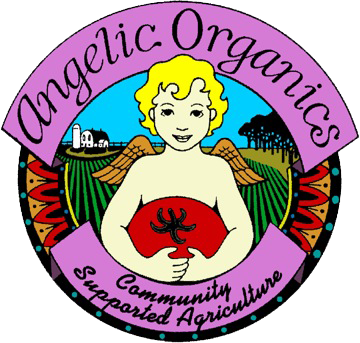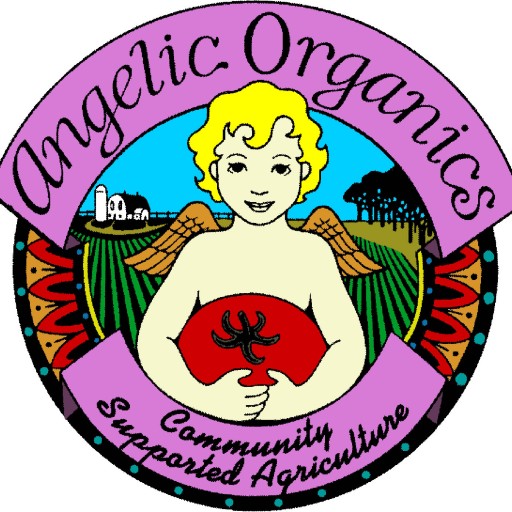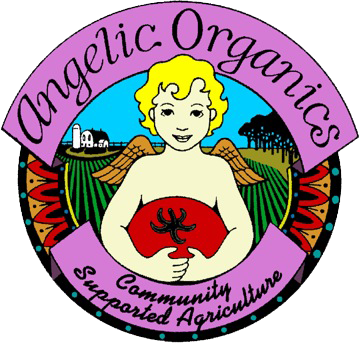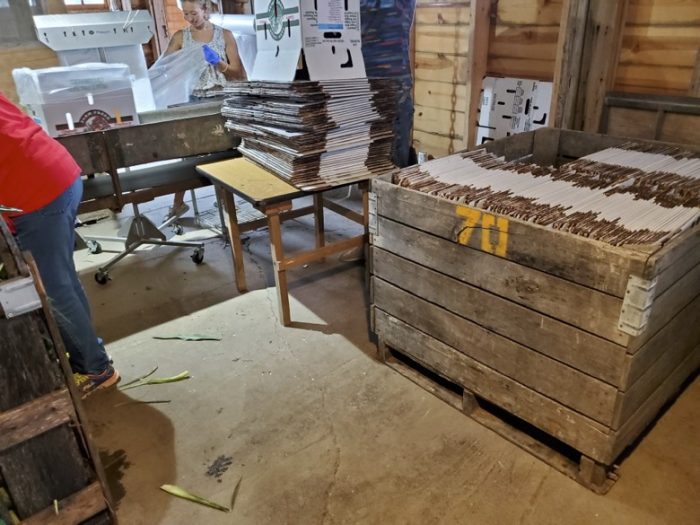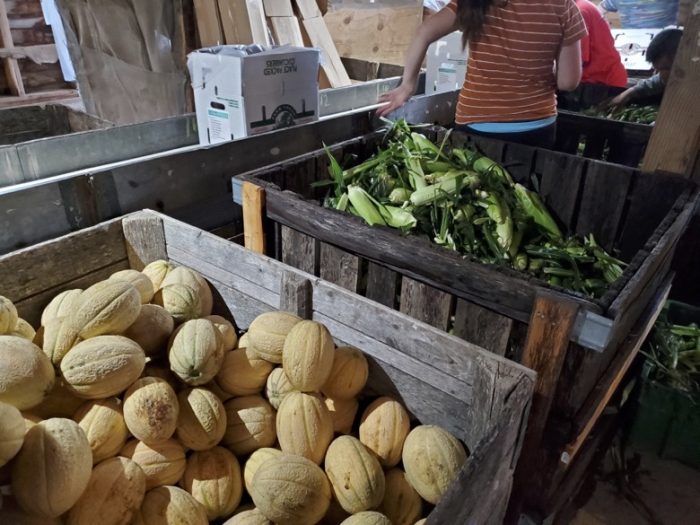Farmer John Writes: From Fertile Soil to Vibrant Pack Line
Harvest Week 8, August 22nd – 27th, 2022
August is the month when we prepare our fields for the next season (while harvesting immense bounty from the current season.) I have often written about this process, and am doing so again, because it is a most exciting and gratifying time on the farm. It is part of a four-year cycle: 2 years in fertility-building cover crops and 2 years in vegetable and herb production. As is true with most field operations here, timing is key. (Typically, in the spring, we seed another 15 to 20 fields to clover, alfalfa and timothy, but in this issue, I am focusing on our summer work with cover crops.)
In mid-August, we deep-till about 20 fields of our standing cover crops of timothy and deep-rooted clover and alfalfa. These crops have been bringing up minerals from deep in the ground, enhancing soil tilth due to their root mass, and encouraging microbial life by making soil more porous and oxygenated. Alfalfa is especially renowned for its 10 to 15 ft deep root structure and its ability to store carbon.
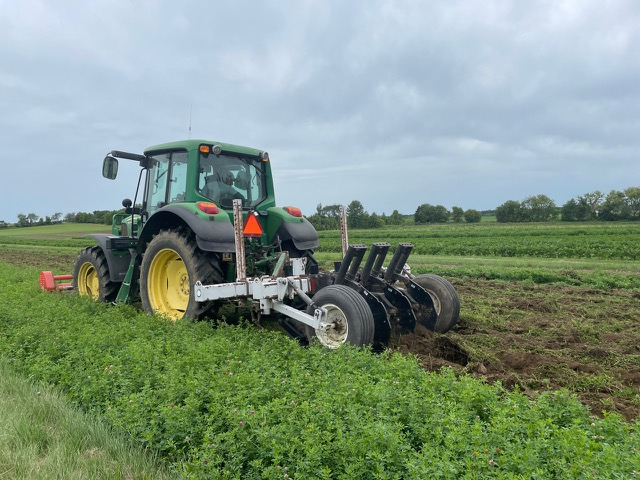
deep tilling timothy, clover and alfalfa
Next we apply 20 tons per acre of compost sourced the previous year from nearby dairy farms, piled into windrows, treated with Biodynamic preparations, and encouraged to decay into a rich, living soil amendment.
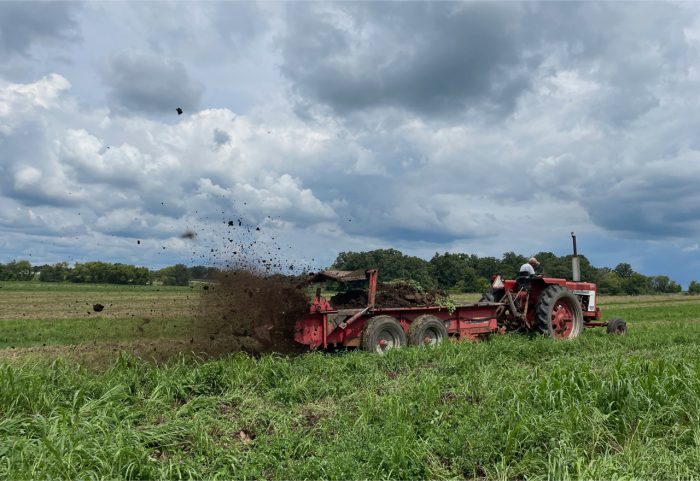
applying compost
Then we till the fields to make the soil suitable for the seeding of fall peas. The peas provide another boost to soil fertility and soil life, while preventing soil erosion.
We strive to complete these preparations for next year’s crops by late August, in order to give the peas time to grow large enough to make a substantial contribution of nitrogen and organic matter before a hard frost.
I highlight that you belong to a farm with an extraordinary soil fertility program. This commitment to soil life is an expensive process—having half the farm out of production every year, mowing the cover crops every few weeks, procuring, mixing, turning, and spreading the compost, purchasing and seeding the alfalfa, clover, timothy, and peas, and eventually tearing up the cover crops. The whole process costs the farm many tens of thousands of dollars per year. But then we/you get more reliable and healthier crop production, and the satisfaction of being part of a very upbuilding commitment to the future.
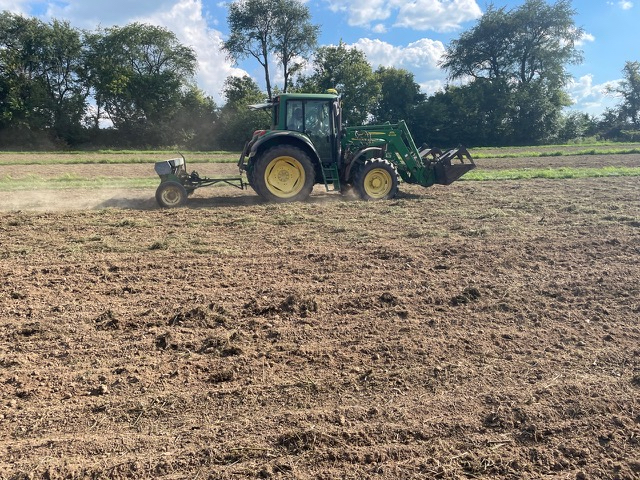
seeding fall peas
Our Community Coordinator Alícia Writes about the Pack Line
Written by Alícia:
“I had the great pleasure of stopping by the farm and joining the packing line. While I’m an avid gardener myself—mostly vegetables, although I’m trying to develop a pollinator plant garden—I spend my workdays behind the computer, working on various administrative issues or putting out fires. It was a treat to take a few hours out of my day to travel to the Angelic Organics farm and have the chance to join volunteers, farmworkers, and other staff members to fill boxes and get them ready to travel to your homes.
we had three such crates of boxes to pack
The packing process is like an assembly line, although without the dullness. A combination of volunteers, farm staff, and farm workers gather and take their stations. Each person is assigned a vegetable or herb, or setting up the boxes, closing them, or making sure the packers have enough vegetables left in their crates for the coming boxes. Meanwhile, an auditor double checks vegetable quality, making sure veggies are added to the right boxes based on the packing label. As boxes come down the line, we start packing, beginning with the hardier vegetables–corn on the bottom since that will help “nest” the other vegetables; muskmelons and cabbage next, followed by the celery and carrots. Layered over that are the zucchinis and cucumbers. Finally, the delicate items: lettuce mix, bunched kale, and herbs like basil and cilantro. Then, the boxes are closed and organized for delivery, depending on host site or home delivery route.
Before the pack began, each of us gathered at our stations, getting to know each other and our duties. As the packing continued, we would figure out extra ways to work together. Two of us were needed on the corn, and we quickly hit a rhythm. She put in the larger share of the corn, telling me how many were still left to place (if any). Meanwhile, I’d scan the first half of the packing list and give a heads up (shout) to the volunteers working on muskmelons and cabbages in case of multiples. Being heavier items, extra time to gather them was appreciated. As we worked, I heard the second half of the line engaging in a similar way. The volunteer in charge of kale, for example, would give a heads up on cucumber and zucchini numbers, and other popular items.
muskmelons and corn
All the way through, I was struck by how the packing line is such a microcosm of the kind of community we build through Angelic Organics and other CSA farms–from seed to seedling, to growing plant and harvestable produce, through the packing and delivery process, and then to you. Many hands handle the produce, tending and watering, harvesting, ensuring quality and packing, and finally reaching your hands, as you open the boxes and pull out plump and ripe veggies. No person is an island, and we are all interconnected. Whether it be through the host site that hosts your box until you can reach it or the delivery driver that brings the box to your door, we are part of a long process that brings a vegetable to life.
The pack line is illuminating of the many hidden processes along the way that leads to the great produce that arrives at our tables.”
end of submission by Alícia
Farmer John’s Note: We’ve been blessed for most of our packs this season with an abundance of volunteers, though sometimes we are a bit short, and rely on our field crew to help with the pack. Here is more about our pack volunteer program: www.angelicorganics.com/pack-volunteer/.
From Our Shareholder Directory

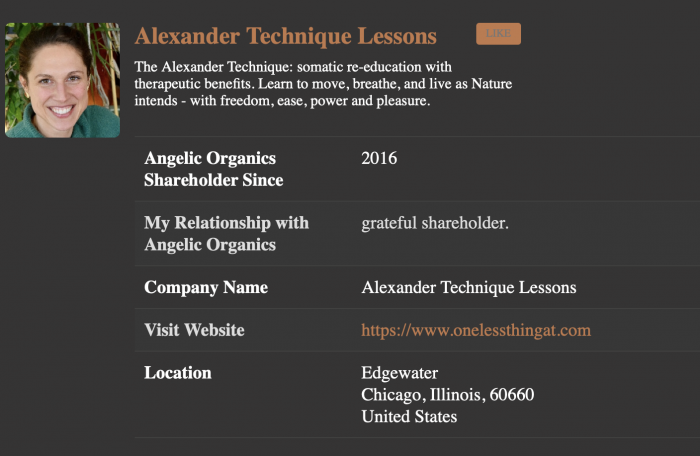
Please join our directory at https://directory.angelicorganics.com/join and support your fellow shareholders. Thank you to the many of you who recently joined.
Shareholders, Come to our Field Day on Saturday, September 17th
- Barn Concert and Barn Dance by Jutta and the Hi-Dukes
- Potluck, hayrides, free pumpkin and gourd picking
- More soon on the Concert and Barn Dance
- Learn more at angelicorganics.com/field-days-for-shareholders/

Shareholders Terran, Jutta & Zoe of Jutta and the Hi-Dukes
Overheard
Septuagenarian neighbor: “A guy came around when I was little offering free trial accordion lessons. By the time we were halfway through my free lesson I wasn’t paying much attention. I was probably looking off in the distance somewhere.”
Accordion instructor: “You are not interested in learning the accordion at all.”
Neighbor: “That’s right.”
Accordion instructor: “You will never amount to anything if you don’t learn how to apply yourself.”
Neighbor: “That was the end of our lesson, but I think I turned out okay.”
Septuagenarian neighbor #2: “My music teacher told me when I was in fifth grade that there was something wrong with my mouth and said I was not allowed to play and he took the trumpet away from me. By eighth grade, I was playing the drums, and the same music teacher told me to just stand there, even at our school band concert, to just stand there and not hit the drums. He said I had no sense of rhythm. And I was the whole percussion section. He did let me ding the triangle once that night, though.”
Warmly,
Farmer John
